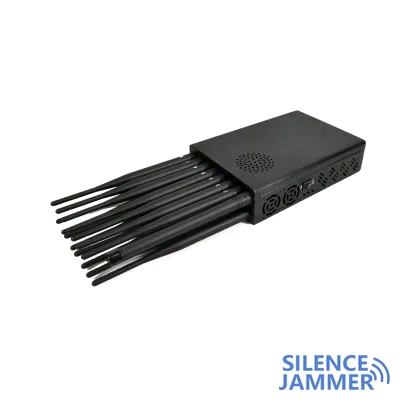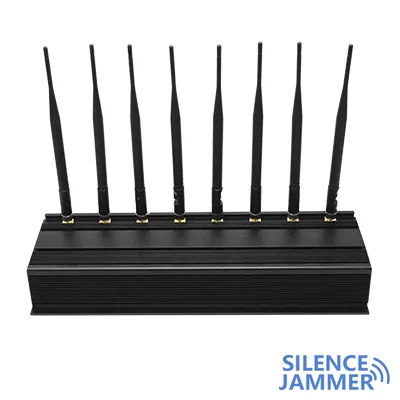
Parappana Agrahara Central Jail in Karnataka, India will install a cell service blocker system worth Rs 50 million by the end of May. This is the first time that the system has been put into use without actually testing it, despite having been approved by the Electronics Corporation of India (ECIL) and the government.
Background of the installation of cell jammer
As one of the largest prisons in India, Parappana Agrahara Central Jail faces the problem of prisoners illegally communicating with the outside world through mobile phones. In recent years, the problem of mobile phones in prisons has become increasingly serious, and prisoners can not only coordinate criminal activities through mobile phones, but also pass information to outside accomplices. To solve this problem, the prison management decided to install mobile signal jammers to cut off the communication channels in the prison.
The plan to install mobile phone blockers has been pushed forward, but it has not been tested in the actual prison environment. ECIL claims that the signal jammer system has been approved by the Special Protection Group (SPG), the Indian Intelligence Bureau (IB) and the Cabinet Secretariat. However, due to budget constraints and testing costs, the prison authorities chose to skip the trial phase and directly install the equipment.
Bharat Electronics Limited (BEL) and a company from Russia have long tried to install similar equipment in Indian prisons, but they have failed due to technical problems. In particular, the system provided by the Russian company, while effective in jamming communication signals within the prison, also accidentally affected normal mobile communications within a radius of 5 kilometers around the prison, which made the problem more complicated.
Health risks and technical challenges of jammers
Although the new system has been approved, some jamming technology experts have warned of serious health risks of traditional mobile phone blocker jammers running around the clock. Experts point out that long-term exposure to electromagnetic radiation emitted by traditional signal jammers may cause harm to human health, especially organs such as kidneys. The most advanced blocker design will only start when the prisoner tries to make a call or send a text message to reduce the potential harm caused by continuous radiation.
Despite these health risks, prison authorities said they were not aware of the safety of the signal blockers and did not take additional precautions against possible health risks. Karnataka police chief KV Gagandeep said he did not have enough information about the potential harm of the jammer device, and that the jammer device was expensive and testing would add unnecessary expenses. Therefore, the prison management chose a system that had not been formally tested.
ECIL's technical confidence and challenges
The Electronics Corporation of India (ECIL) emphasized its expertise in mobile phone blockers, claiming that the company has installed similar systems in prisons in several Indian states, including 10 prisons in Chhattisgarh, 4 prisons in Odisha and 18 prisons in Jharkhand. ECIL's technical director Prasada Rao said the company used "state-of-the-art proprietary technology" and that the new system was more efficient than traditional equipment and had passed rigorous tests by SPG and IB.
The installation process was not without challenges. Due to the lack of preliminary testing, the technical team relied more on on-site surveys during implementation, assessing the prison's building structure and surrounding environment to determine the specific configuration of the signal blocker jammer. In addition, although ECIL promised to provide round-the-clock maintenance services, there was a cell service signal blocker failure in the Sellakera prison, which led to a jailbreak, causing some people to question the reliability of the technology.
Government decision and subsequent impact
As for the use of jammers without trial, the prison department explained that the cost of testing signal blockers was too high, so they chose to install them directly according to ECIL's recommendations. Nevertheless, Gagandeep, the director general of police, stressed that all decisions strictly follow the government's approval procedures. For other manufacturers' equipment, including systems produced by Russian companies, although they can effectively interfere with mobile phone signals in local areas, they have a greater impact on external networks and bring side effects to communication services, so they have not been adopted.

The government and ECIL said that the technology of the new signal jammer has been fully verified. In fact, there are still unforeseen problems in the performance of untested equipment in actual operation. For example, the equipment may have unstable signal shielding, affecting normal communication inside and outside the prison, and may even cause health problems. Therefore, subsequent monitoring and technical adjustments are very important.
Although ECIL promised that the jammers in the prison can operate 24/7 and provide maintenance support, there are still questions about whether this equipment is sufficient to cope with the prisoners' evolving communication methods. With the popularization of smartphones and other advanced communication tools, how to keep communications in prisons secure will become an ongoing challenge.
The Parappana Agrahara Central Prison in Bangalore, India has solved the problem of illegal communications in prisons to a certain extent, the use of jammer systems that have not been fully tested is still full of uncertainty. In the future, how to balance the effectiveness and safety of technology and how to avoid health risks caused by equipment will be important issues that prison management departments must continue to explore.





